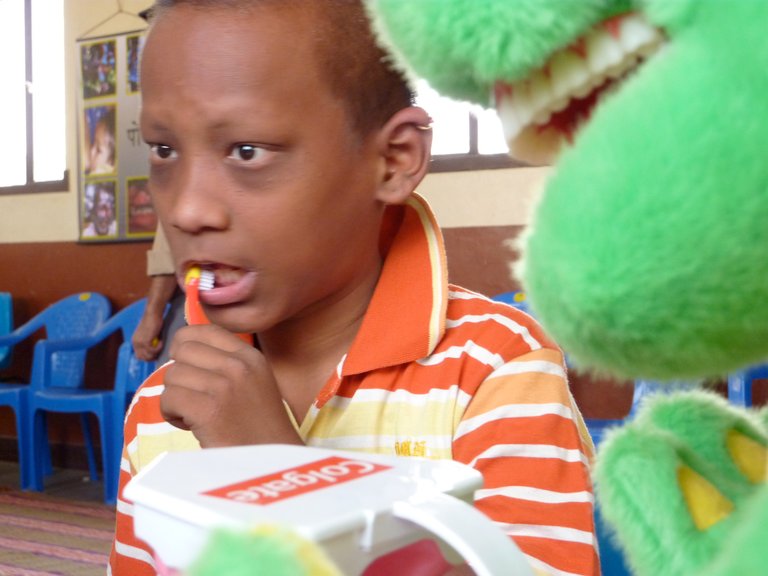Possible Mental Health Cases in Children.
My friend and I were having a conversation lately about different strange pregnancies happening and I was shocked to hear for the first time about a baby who was born mad, and remained in that mad state until he became a teenager and finally passed on.
Oh, the religiosity in me immediately made me scream, No, that is just highly demonic. but remembering that I actually did a science study for a few years in my life, I decided to read more and search for articles that could describe this situation for me. Unfortunately, I didn't get any article that talked about anything of the sort (if you find any, you can share), but I got some information on how mental health issues can affect children instead.

credit
Some research shows that children actually show very obvious signs of anxiety disorders, depression, conduct disorder, post-traumatic stress disorder, and autism amongst others at a very early stage.
Diagnosing these conditions in children may however not be as convenient, as it is in diagnosing in adults, and this is because little children process and respond to emotional and traumatic events in ways that are clearly different from adults.
The mental health problems that children have, have to first be handled within the context of families, relations, and communities. A child's well-being is closely associated with the region where the child lives, so when the relationship from these environments turns out to be an abusive, life-threatening, or neglectful one, it affects their mental health greatly.
For me, the most important thing is for parents to be able to identify the displayed signs by kids on time in order to know how to start helping the child out before it gets to a complicated point.

credit
Some of these signs will help you know that your child is silently crying out for help and you need to get one as urgent as you can;
- Sudden change in eating habits.
- They just want to stay away from school.
- Academic performance that suddenly changes.
- Inability to concentrate appropriately.
- Behaviors that are out of control, in most cases even leading to harm.
- Consistent stomach aches or headaches.
- Mentioning suicide/death during their conversation.
One mistake most adults make is thinking that, children do not develop any form of mental health issue, or that children should be immune to the effects that proceed thereof. This is a big mistake because children also have the strong ability to understand and react to other people's intentions and emotions.
Why don't we get through some of the mental health disorders children go through that professionals have been able to identify?
Autism spectrum disorder (ASD): Children with this disorder in most cases have attention difficulty, they may be hyperactive or impulsive too, and on a few occasions, they possess a combination of the symptoms.
Anxiety Disorders: When a child has this disorder, it is noticed that the child consistently shows signs of worry, fear, or anxiety. These signs would interfere with the ability of the child to participate in some important social activities.
Eating Disorders: Often associated with the child being fed with information about getting a certain body type which would then result in an unsafe or unhealthy diet or eating habit. In the long run, we would have a case of a life-threatening situation if care is not taken.
Schizophrenia: This unpleasant disorder makes the affected human lose touch with reality. When it happens, there are hallucinations, disordered thinking and behaviors, and delusions.
Depression: A child could also experience depression, which is the child constantly feeling sad or loss of interest in meaningful activities, this includes even interaction with other children in school.
Post-traumatic stress disorder (PTSD): A long-term emotional unbalance, nightmares, disturbing memories, anxiety, and panic would be displayed by a child affected with PTSD, which is coming in response to unpleasant situations of abuse, violence, or other traumatic events.
In order to help a child who is having mental illness issues, it is a great idea to get a fast medical examination and of course, a professional help to save the day. However, I am still very interested in learning about the scientific description of having an infant psychiatric case from the womb, and when I do find out, I will come to share it here.
Please, do not confuse signs of mental health issues as just a phase that will pass, take it as seriously as anything else, and get appropriate help.
References.
https://www.apa.org/news/press/releases/2011/02/babies-mental-illness
https://developingchild.harvard.edu/science/deep-dives/mental-health/
https://www.medicinenet.com/mental_illness_in_children/article.htm
Congratulations @oluwatobiloba! You have completed the following achievement on the Hive blockchain And have been rewarded with New badge(s)
Your next target is to reach 22000 upvotes.
You can view your badges on your board and compare yourself to others in the Ranking
If you no longer want to receive notifications, reply to this comment with the word
STOPTo support your work, I also upvoted your post!
Thanks for your contribution to the STEMsocial community. Feel free to join us on discord to get to know the rest of us!
Please consider delegating to the @stemsocial account (85% of the curation rewards are returned).
Thanks for including @stemsocial as a beneficiary, which gives you stronger support.